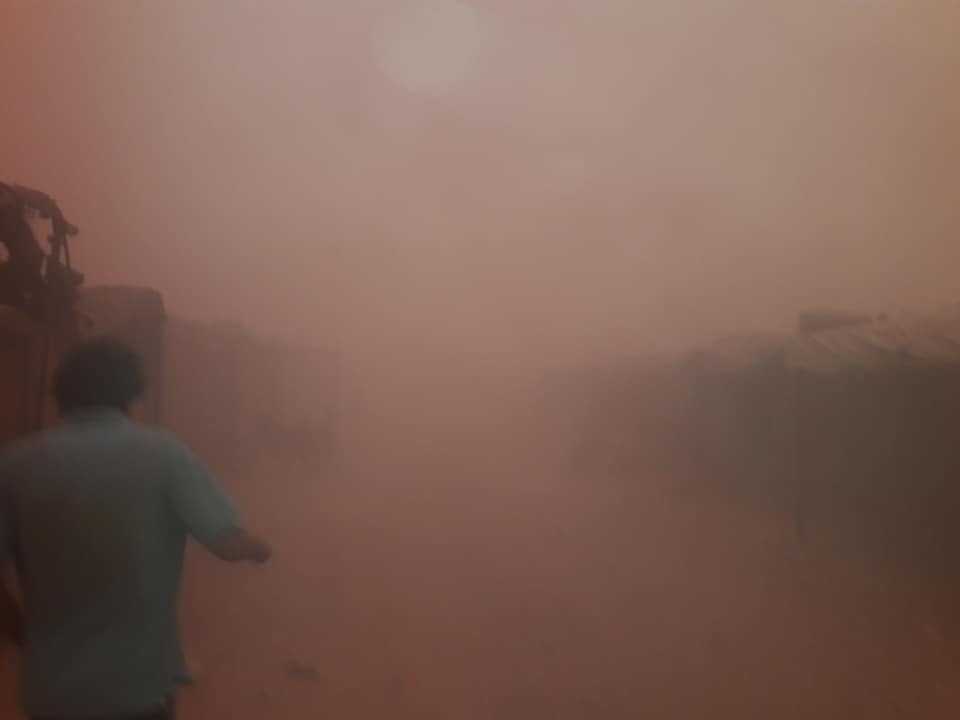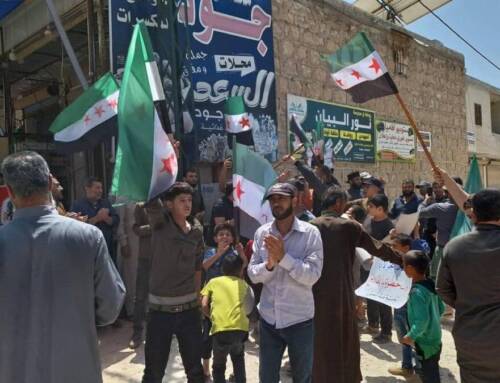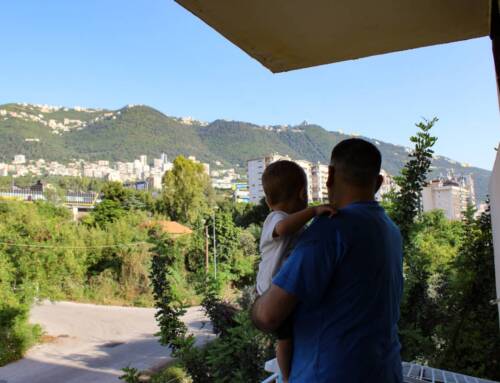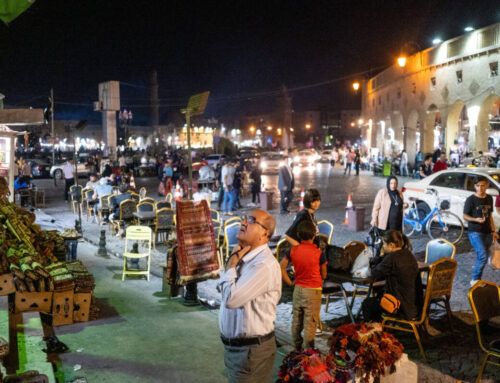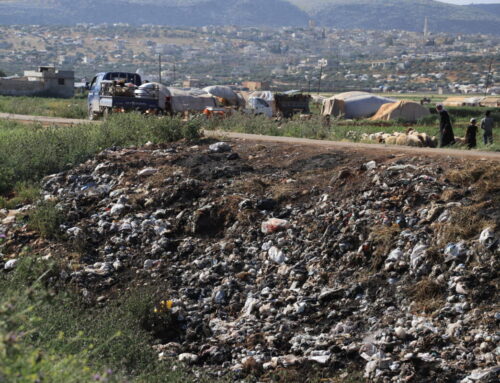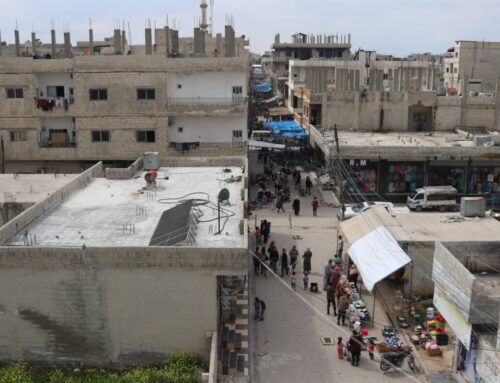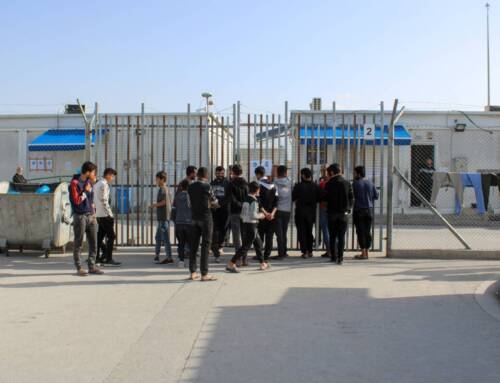Stranded in Syrian desert, Rukban’s displaced wait on stalled UN aid delivery
A sandstorm hits Rukban camp in October. Photo courtesy of Rukban […]
30 October 2018

AMMAN: Tens of thousands of civilians stranded in the desolate Rukban camp in the deserts of eastern Syria are desperately low on supplies, with a planned UN aid convoy now delayed for a fifth consecutive day.
The UN aid convoy was originally slated to go ahead on October 25 but was subsequently delayed for two days due to unspecified “security reasons.”
The convoy was then delayed again on October 27, though no clear timeline was given for the delivery of supplies, UN officials said at the time.
UN officials on Tuesday were “still discussing [the aid delivery] with all parties,” Fadwa Baroud, a UN spokesperson in Damascus, told Syria Direct on Tuesday.
However, it was “not clear yet” whether security and logistical conditions had improved enough for the convoy to begin moving, she added.
UN Humanitarian Coordinator in Syria Ali al-Zaatari said on Tuesday that delays since October 27 were “based on available information of [a] real security threat against the convoy,” adding that discussions about how to deliver the aid were “ongoing.”
Existing supplies of food and medicine inside Rukban meanwhile are dwindling to dangerously low levels, camp residents tell Syria Direct, with few options left to bring in new shipments.
Omar a-Shawi,* a citizen journalist within the camp, told Syria Direct on Tuesday that medical supplies were now “virtually nonexistent” while the prices of remaining medicine had “doubled” in recent days.
“There is major suffering as a result of the medical cutoff,” he added.
According to 42-year-old camp resident Abdul Rahman Ismail, who spoke to Syria Direct on Tuesday, staple items such as baby formula and vegetables are simply “running out.”
Stranded in a remote, makeshift camp in the deserts along the Syrian-Jordanian border, residents in Rukban have long endured shortages of food and medical supplies. But conditions have rapidly deteriorated since a desert smuggling route that once provided a lifeline to Rukban was closed earlier this month. Smugglers would bring in goods from government-held areas including Damascus—a 260-kilometer journey that took somewhere between three to four hours before the war—and then sell those goods at marked up prices within the camp.
That irregular route is now shut after pro-government forces in the surrounding area reportedly cut off access. The cutoff has seen available food and medicine—which were already in desperately short supply—spread dangerously thin as prices skyrocket. Some camp residents have described the cutoff as a “siege.”
At least two young children, one just several months old, have died amid the shortages, Rukban news pages reported earlier this month.

Rukban is temporary home to an estimated 50,000 people, many of whom fled their hometowns in central and eastern Syria during the rise of the Islamic State (IS). Displaced Syrians there today live in threadbare tents and mud houses sprawled out across a no-man’s-land between the Syrian and Jordanian border lines known as the “berm.”
The last official UN aid delivery to reach the poorly served encampment was in January of this year, via a series of cranes that dropped food and medical parcels into Rukban from the Jordanian side of the border.
This roughly 55-kilometer corner of desert in eastern Syria is nominally controlled by rebel forces backed by the US-led anti-IS coalition, which operates from the al-Tanf military base just a few kilometers east of Rukban.
Surrounding that 55km zone, agreed upon last year by Russian and US forces, lie vast swathes of territory held by the Syrian government. There, pro-government forces—as well as allied Iranian and other militias—maintain a continued presence.
The Jordanian border lies directly to the south of Rukban.
Jordan’s Foreign Minister Ayman Safadi has previously stated that Rukban is a Syrian issue—and not the responsibility of the Jordanian government. Meanwhile, Syrian, Russian and US-backed coalition officials have all frequently blamed one another for “impeding” humanitarian access to the camp.
On October 29, leading Syrian diplomat Bashar a-Jaafari told the UN Security Council in New York City that the Syrian government had agreed for the Rubkan convoy to go ahead, claiming that the delay was evidence that the US was the “main [actor] impeding delivery of humanitarian aid to the Rukban camp, and the main reason for the suffering of its civilian residents.”
US-backed rebels, meanwhile, say Damascus is the one responsible for the delay. An official from the US-backed rebel group Maghawir a-Thawra, based in al-Tanf, told Syria Direct on Tuesday that his forces were “ready to receive the convoy and secure the route.”
“The ball is in the regime’s court,” he added.

While actors with a stake in the fate of Rukban exchange blame, those living inside the camp today describe increasingly siege-like conditions in which potentially life-saving food and medical supplies continue to go undelivered.
Camp officials meanwhile say they have precious little food and medicine handouts left to stave off the hunger and sickness spreading through Rukban since the cutoff earlier this month.
“We are trying to communicate with the UN” in response to the aid convoy’s delay, Ahmad Zgheira, a member of Rukban’s local camp-run administration, told Syria Direct on Tuesday.
“As for us, we have nothing we can provide to camp residents except for pleas to humanitarian organizations to save us.”
Ismail, the 42-year-old camp resident, said he is worried for the coming winter months as temperatures drop dramatically and rainstorms turn Rukban’s dirt streets to mud.
“It’s very cold here,” the father of five told Syria Direct via WhatsApp, “especially at night.”
“But at least I’m still alive, thank God.”
*Omar a-Shawi participated in a remote Syria Direct training session from Rukban camp earlier this year. He continues to work as a media activist in the camp, where he helps run a local news page.

